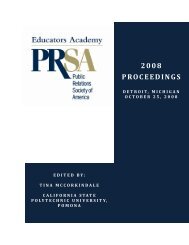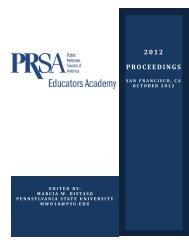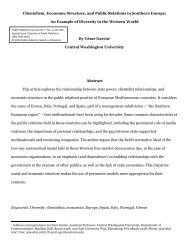2010 - Public Relations Society of America
2010 - Public Relations Society of America
2010 - Public Relations Society of America
You also want an ePaper? Increase the reach of your titles
YUMPU automatically turns print PDFs into web optimized ePapers that Google loves.
produced blogs <strong>of</strong> famous bloggers who write commentaries about products. Cheng explains<br />
that marketers <strong>of</strong>ten target the top one or two most popular Taiwan bloggers because they want<br />
to see instant effects. These “A-list” bloggers are perceived by blog readers as ordinary<br />
consumers and more trustworthy than product marketers, media or celebrity endorsers (Shi,<br />
2008). Moreover, product recommendations by A-list bloggers are interesting to read and do<br />
not look or read like an advertisement.<br />
As in the United States, blog marketing has become a controversial marketing practice<br />
that has prompted extensive arguments in Taiwan’s blogosphere. Some bloggers and blog users<br />
believe that bloggers need to disclose possible conflicts <strong>of</strong> interest (Huang et al., 2008; Kates,<br />
2008; PipperL, 2008; Rickyli, 2005). Others argue that a blog is the blogger’s private space, not<br />
commercial speech, and that bloggers can and should write anything they wish. Defenders argue<br />
that blog readers do not pay for the information they obtain free from bloggers, and can choose<br />
which blogs to read and believe (DearJohn, 2008; Huang et al., 2008).<br />
In United States, the Federal Trade Commission now requires bloggers to disclose<br />
freebies (free merchandise provided for evaluation, which the blogger can keep or sell) as well as<br />
payments (cash compensation from a company) received in exchange for writing a product<br />
recommendation) (FTC News, 2009). FTC commissioners think transparent and conspicuous<br />
disclosure is good and necessary (Yao, 2009). Mass media in the U.S. have followed similar<br />
procedures for decades—and affirmatively guard against possible conflicts <strong>of</strong> interest related to<br />
cross-industry ownership <strong>of</strong> media and the industrial firms they cover (Choney, 2009). Freebies<br />
are discouraged in the code <strong>of</strong> ethics promulgated by organizations such as the <strong>Society</strong> <strong>of</strong><br />
Pr<strong>of</strong>essional Journalists (1996) and the <strong>Public</strong> <strong>Relations</strong> <strong>Society</strong> <strong>of</strong> <strong>America</strong> (2009). However,<br />
such protections are virtually non-existent in Taiwan (Qiu, 2009).<br />
Theoretical Foundations<br />
Again this backdrop, this study sought to examine perceptions <strong>of</strong> product blogs as an<br />
influential source <strong>of</strong> product information for consumers in Taiwan. In particular, this study drew<br />
upon three key concepts as its theoretical foundation: uses and gratifications theory as a basis for<br />
understanding the motivation <strong>of</strong> blog readers, the affiliation or independence <strong>of</strong> the bloggers as a<br />
means for assessing the credibility <strong>of</strong> blogs, and language expectancy theory as a way to<br />
understand the content blog readers expect to find. The study then measured the effect <strong>of</strong> these<br />
independent or predictor variables on four key criterion or dependent measures: readership <strong>of</strong><br />
blogs, attitudes, behavioral (purchase) intent and the likelihood readers will share information<br />
with others.<br />
Motivations for Blog Use<br />
Uses and gratifications theory (U&G) posits that people purposefully choose appropriate<br />
media to satisfy their needs and goals (Li, 2007). Prior research suggests that blog readers are<br />
quite intentional (Kaye, 2007; Li, 2007; Meadows, 2008; Swanson, 1979), and the interactive<br />
nature <strong>of</strong> blogs demands that users engage in selecting, responding to, forwarding and actively<br />
processing blog messages using a computer keyboard or the touchpad on a wireless device<br />
(Cowels, 1989).<br />
In general, uses and gratifications theory identifies four broad motivations for media use.<br />
These involve the satisfaction <strong>of</strong> cognitive needs (surveillance <strong>of</strong> the environment, need for<br />
cognition, problem solving), the development <strong>of</strong> self-identity, social utility (advantageous use <strong>of</strong><br />
information for social purposes), and diversion/entertainment (Katz, Blumler & Gurevitch, 1973;<br />
Rubin, 1984, 1994; 2002).<br />
78
















